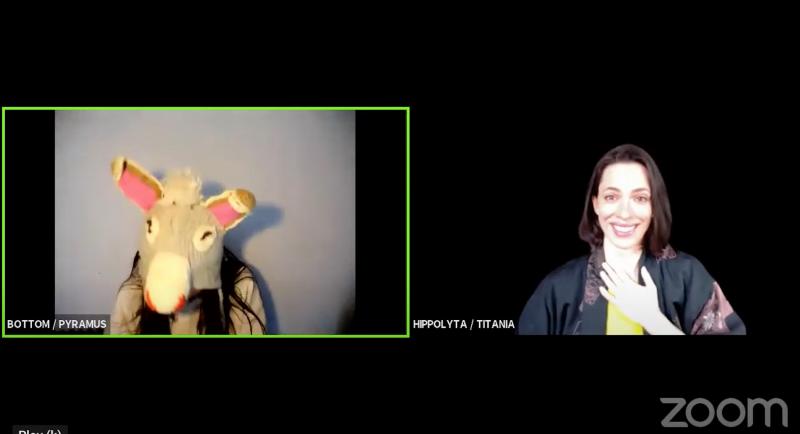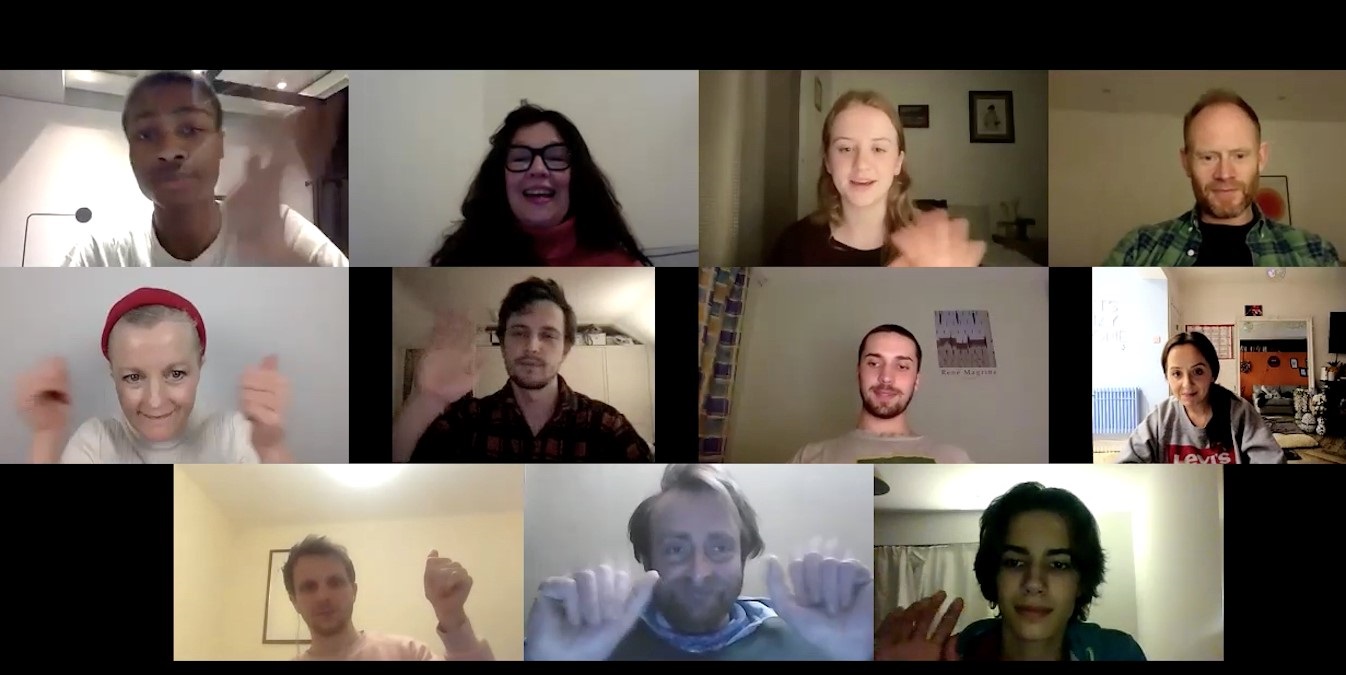A Midsummer Night's Dream, SHAKE Festival livestream review - a star turn from Luisa Omielan makes this 'Bottom's Dream' | reviews, news & interviews
A Midsummer Night's Dream, SHAKE Festival livestream review - a star turn from Luisa Omielan makes this 'Bottom's Dream'
A Midsummer Night's Dream, SHAKE Festival livestream review - a star turn from Luisa Omielan makes this 'Bottom's Dream'
Jenny Caron Hall's production, with sister Rebecca starring, offers 'mechanical' treats

Just what the Zoom era has brought to theatre – to performers and audiences alike – is something we will no doubt be pondering for some while yet, certainly still in the much-anticipated eventual hereafter when stages in their “traditional” multifariousness are once again standard.
Following one of the best-known phrases from this early Shakespeare comedy, love may look “not with the eyes but the mind” – but, as multi-screen viewers, is our attention inevitably predicated upon the former? Does any degree of excellence in verse delivery suffer when faced with the reality of a pale front-on screen? One of the cast of this Dream, Wendy Morgan, has put it very well in a related context when she interrogated the challenge of how “to convey magic in a very small picture frame”. Given that Morgan was playing Puck here, her task was made doubly hard by having to capture her character’s supernatural repertoire “without wires, costume or wings”.
“Conjure with words, but own the screen” might be a slogan for Zoom performance. You might expect the former to be a given – though some of the delivery here, from one character in particular, was distinctly dull – but achieving the latter is a different matter. Not least because, if everyone was trying their damnedest to dominate their separate screen all the time, the effect would become catatonically distracting. Dan Stevens as Oberon/Theseus achieved something very bizarre indeed, which looked most of all like – unless it reached me with a tech glitch, of course, the kind of “screwed mechanical” that's always a risk with livestream – a filter that cropped his flowing locks into all sorts of weird cuts, as well as giving his blue eyes a manically piercing glint. Character-wise, it endowed his double roles with greater cruelty than usual, harking forward perhaps to the deranged Leontes of two decades down the canon. Visually, however, there were occasions when it felt like more of a sub-par Dracula imitation, which brought a novel vampiric facet to the text, phrases like “yet, ‘ere day” acquiring unusual urgency.
Dan Stevens as Oberon/Theseus achieved something very bizarre indeed, which looked most of all like – unless it reached me with a tech glitch, of course, the kind of “screwed mechanical” that's always a risk with livestream – a filter that cropped his flowing locks into all sorts of weird cuts, as well as giving his blue eyes a manically piercing glint. Character-wise, it endowed his double roles with greater cruelty than usual, harking forward perhaps to the deranged Leontes of two decades down the canon. Visually, however, there were occasions when it felt like more of a sub-par Dracula imitation, which brought a novel vampiric facet to the text, phrases like “yet, ‘ere day” acquiring unusual urgency.
Owning the screen has long been second nature for Rebecca Hall (another member of the illustrious theatrical family dynasty, of course, if further such acknowledgement is needed: roles in A Midsummer Night’s Dream and The Tempest were central to Jenny Caron Hall’s own stage career, which ended with her 1988 Miranda in a National Theatre production of the latter by her late father, Peter Hall). But playing Stevens’s consort Titania/Hippolyta here, the younger Hall daughter went further, simply seducing the screen with generous lashings of old-fashioned sex appeal. Hall can cup her hands to indicate sleep with an élan that's miles away from the clumsy postures of the rest of these somnolent Athenian grove nappers. Oberon and Titania played out their regal scenes against a gold metallic background that suggested more than anything that some Rank Screen gongsman was looming over them in the wings, an aristo touch rather enforced by the suspicion that Hall had appropriated a Downton accent from Stevens for her Amazonian incarnation. (Lady Hippolyta, the Crawley sister we never got to know and love?)
Wendy Morgan’s Puck brought a nice fluidity to the role, and she has learned what not all players here had: adjusting the distance that your chair sits from the screen can create nice variations of image (similar kudos to David Sibley’s Egeus, whose delivery was also excellent). Máiréad Tyers’s Irish lilt as Hermia gave her character an innocence that nevertheless fused with hints of sexuality, all enhanced by the way that Tyers made the mobility of thoughts palpable. Across the distances of a theatre that's something we might catch at but no more, yet in close-up it was engrossing.
But the standout was comedian Luisa Omielan, playing Bottom with a joie de vivre and parodically Eastern European accent that was a delight. From the moment her face appeared onscreen, hair bunched over head and those Slavic tones wickedly controlled in their comic intonation, we knew she was a winner. Omielan was as perfect pondering phrasings like “either your straw-colour beard, your orange-tawny beard, your purple-in-grain beard, or your French-crown-colour beard, your perfect yellow”, as she was in the ass-head scenes with Hall (main picture), the effect there no less effortless for the fact that all we saw was her knitted maw. For viewers of a certain vintage, comparisons with that other classic anthropomorphic double-act, Rod Hull and Emu, even the immortal Basil Brush, are surely not out of order.
If to date the question associated with Omielan has often been “What Would Beyoncé Do?!”, now it’s surely “Where will Luisa Omielan star next?” A straight stage role surely beckons – unless, of course, it was exactly the specific opportunities of this “small picture frame” that brought out such brilliance. That's another thing to ponder about the Zoom era as it draws towards its conclusion, alongside a very nice ending here from Jenny Hall, her Dream awakening to the redolent folk melodies of "Foggy, Foggy Dew".
rating
Explore topics
Share this article
Add comment
The future of Arts Journalism
You can stop theartsdesk.com closing!
We urgently need financing to survive. Our fundraising drive has thus far raised £49,000 but we need to reach £100,000 or we will be forced to close. Please contribute here: https://gofund.me/c3f6033d
And if you can forward this information to anyone who might assist, we’d be grateful.

Subscribe to theartsdesk.com
Thank you for continuing to read our work on theartsdesk.com. For unlimited access to every article in its entirety, including our archive of more than 15,000 pieces, we're asking for £5 per month or £40 per year. We feel it's a very good deal, and hope you do too.
To take a subscription now simply click here.
And if you're looking for that extra gift for a friend or family member, why not treat them to a theartsdesk.com gift subscription?
more Theatre
 Troilus and Cressida, Globe Theatre review - a 'problem play' with added problems
Raucous and carnivalesque, but also ugly and incomprehensible
Troilus and Cressida, Globe Theatre review - a 'problem play' with added problems
Raucous and carnivalesque, but also ugly and incomprehensible
 Clarkston, Trafalgar Theatre review - two lads on a road to nowhere
Netflix star, Joe Locke, is the selling point of a production that needs one
Clarkston, Trafalgar Theatre review - two lads on a road to nowhere
Netflix star, Joe Locke, is the selling point of a production that needs one
 Ghost Stories, Peacock Theatre review - spirited staging but short on scares
Impressive spectacle saves an ageing show in an unsuitable venue
Ghost Stories, Peacock Theatre review - spirited staging but short on scares
Impressive spectacle saves an ageing show in an unsuitable venue
 Hamlet, National Theatre review - turning tragedy to comedy is no joke
Hiran Abeyeskera’s childlike prince falls flat in a mixed production
Hamlet, National Theatre review - turning tragedy to comedy is no joke
Hiran Abeyeskera’s childlike prince falls flat in a mixed production
 Rohtko, Barbican review - postmodern meditation on fake and authentic art is less than the sum of its parts
Łukasz Twarkowski's production dazzles without illuminating
Rohtko, Barbican review - postmodern meditation on fake and authentic art is less than the sum of its parts
Łukasz Twarkowski's production dazzles without illuminating
 Lee, Park Theatre review - Lee Krasner looks back on her life as an artist
Informative and interesting, the play's format limits its potential
Lee, Park Theatre review - Lee Krasner looks back on her life as an artist
Informative and interesting, the play's format limits its potential
 Measure for Measure, RSC, Stratford review - 'problem play' has no problem with relevance
Shakespeare, in this adaptation, is at his most perceptive
Measure for Measure, RSC, Stratford review - 'problem play' has no problem with relevance
Shakespeare, in this adaptation, is at his most perceptive
 The Importance of Being Earnest, Noël Coward Theatre review - dazzling and delightful queer fest
West End transfer of National Theatre hit stars Stephen Fry and Olly Alexander
The Importance of Being Earnest, Noël Coward Theatre review - dazzling and delightful queer fest
West End transfer of National Theatre hit stars Stephen Fry and Olly Alexander
 Get Down Tonight, Charing Cross Theatre review - glitz and hits from the 70s
If you love the songs of KC and the Sunshine Band, Please Do Go!
Get Down Tonight, Charing Cross Theatre review - glitz and hits from the 70s
If you love the songs of KC and the Sunshine Band, Please Do Go!
 Punch, Apollo Theatre review - powerful play about the strength of redemption
James Graham's play transfixes the audience at every stage
Punch, Apollo Theatre review - powerful play about the strength of redemption
James Graham's play transfixes the audience at every stage
 The Billionaire Inside Your Head, Hampstead Theatre review - a map of a man with OCD
Will Lord's promising debut burdens a fine cast with too much dialogue
The Billionaire Inside Your Head, Hampstead Theatre review - a map of a man with OCD
Will Lord's promising debut burdens a fine cast with too much dialogue

Comments
A very interesting read, and